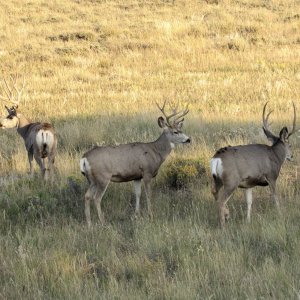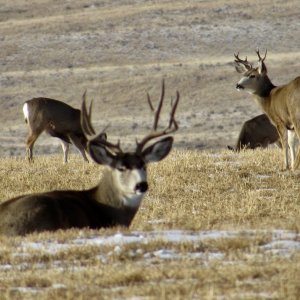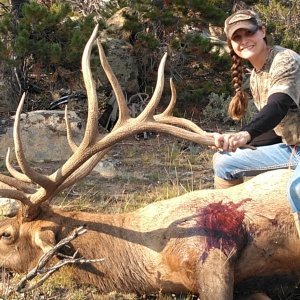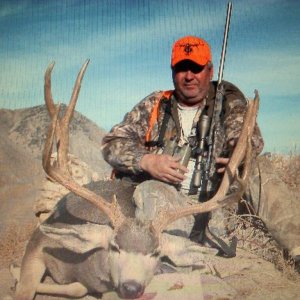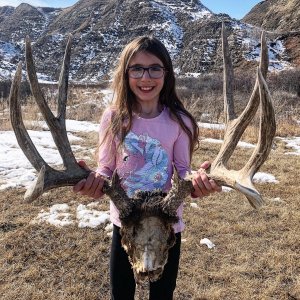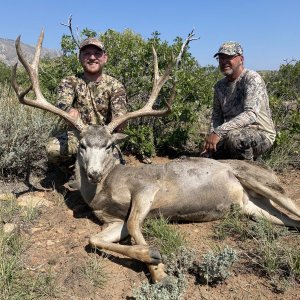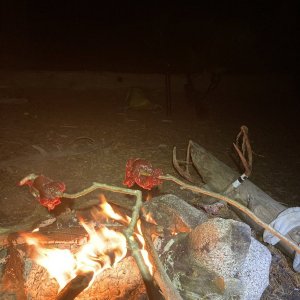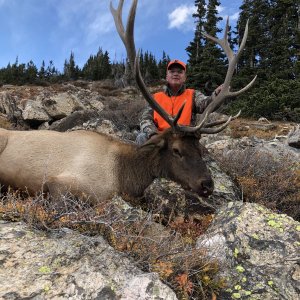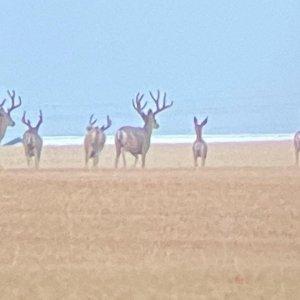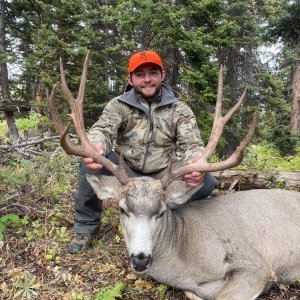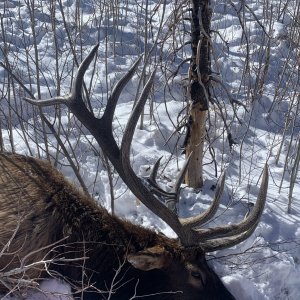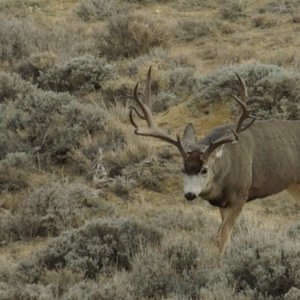I was wondering your thoughts on how much headlamps and flashlights scare the deer during the pre-dawn darkness while hiking into your hunting spot? Was wondering if the deer can tell the difference between a light being real close (100 yards) or a far off light(300-400 yards or more)? At what point do you shut off light and go the final distance in total darkness?
You are using an out of date browser. It may not display this or other websites correctly.
You should upgrade or use an alternative browser.
You should upgrade or use an alternative browser.
Headlamps/Flashlights affect on game
- Thread starter solo
- Start date
hornkiller
Long Time Member
- Messages
- 4,216
I would say if they even see your light they know the gigs up seen it half a dozen times they just get up and leave!


I expect that noise and odor are bigger factors at that time of day. I don't know how good their night vision is as far as distance vision is and when posing the question here found that apparently no one else knows either. When walking on good trails or in country without a thick canopy I find star light sufficient. Cloudy nights require some light. In the timber a light is needed.
Use it when you need to, but if you can walk safely without, don't use it. It takes up to an hour for you eyes to maximize their adjustment to the dark, so the less you use the light, the better.
Use it when you need to, but if you can walk safely without, don't use it. It takes up to an hour for you eyes to maximize their adjustment to the dark, so the less you use the light, the better.
fullcurl74
Active Member
- Messages
- 368
I've wondered this same thing. I've heard that a red lens doesn't disturb them as bad, but I don't know who decided that or how true it is.
I agree, use light when you have too and when its not required, dont use it. If you need it to get into position for first light of the day, its a risk you have to take.
I cant say if it spooks them, as if I need light to see its dark out, therefor cant see the spooked animal move out in that case.
I do know at times it dont spook them though. Many times have deer or elk close to me in the morning spots when its light enough to see, so I presume they were there when I walked into position with my light in the dark or close to it.
I cant say if it spooks them, as if I need light to see its dark out, therefor cant see the spooked animal move out in that case.
I do know at times it dont spook them though. Many times have deer or elk close to me in the morning spots when its light enough to see, so I presume they were there when I walked into position with my light in the dark or close to it.
sageadvice
Long Time Member
- Messages
- 11,849
I worry about that too so at my age, i just get a little more sleep. 
Joey
"It's all about knowing what your firearms practical limitations are and combining that with your own personal limitations!"
Joey
"It's all about knowing what your firearms practical limitations are and combining that with your own personal limitations!"
Just saw this and can't help myself.
Deer and elk don't know that a light is a threat. If they were that smart, you could never hit one on the road with your truck at night.....or poach one with a spotlight.....and both of those scenarios are WAY easier than stalking one in the daylight.
They are dumb animals and have no way to relate a light to humans. They can't see you holding it. And they can't reason out the correlation between a light and danger.
They will HEAR you tromping around, in which case they will leave, but that will happen, light or no light.
A red light is very effective and since that is what the military uses for night ops, there must be something to it.
Either way, it is better to be able to see your way to your area, get in quick without tearing your sack off on a stump or falling down and busting your rifle.
"I could eat a bowl of Alphabet Soup and
sh!t a better argument than that!"
Deer and elk don't know that a light is a threat. If they were that smart, you could never hit one on the road with your truck at night.....or poach one with a spotlight.....and both of those scenarios are WAY easier than stalking one in the daylight.
They are dumb animals and have no way to relate a light to humans. They can't see you holding it. And they can't reason out the correlation between a light and danger.
They will HEAR you tromping around, in which case they will leave, but that will happen, light or no light.
A red light is very effective and since that is what the military uses for night ops, there must be something to it.
Either way, it is better to be able to see your way to your area, get in quick without tearing your sack off on a stump or falling down and busting your rifle.
"I could eat a bowl of Alphabet Soup and
sh!t a better argument than that!"
B
bucklover
Guest
Gotta disagree! It only takes about one experience for critters to relate flashlights to humans. Headlights and spotlighting are a different kind of light. These lights temporarily blind an animal, and so they just stand still or panic, and run in any direction, trying to get away. When I have to use light hiking in, I hold a small flashlight in my closed hand, down close to the trail. If I need light, I open my hand only as much as needed, making sure the actual flashlight is not beaming in a forward and visible direction. Smell is definitely a critter's best defense, but hearing and sight are a very close second. It takes quite a while for wild animals to adjust to night vision. That's the main reason for timed closing times, like are set for migratory birds. They can't see well just before dark. However, just before daylight, most critters have very good vision.
elkfromabove
Very Active Member
- Messages
- 2,113
>Gotta disagree! It only takes about
>one experience for critters to
>relate flashlights to humans. Headlights
>and spotlighting are a different
>kind of light. These lights
>temporarily blind an animal, and
>so they just stand still
>or panic, and run in
>any direction, trying to get
>away. When I have
>to use light hiking in,
>I hold a small flashlight
>in my closed hand, down
>close to the trail. If
>I need light, I open
>my hand only as much
>as needed, making sure the
>actual flashlight is not beaming
>in a forward and visible
>direction. Smell is definitely a
>critter's best defense, but hearing
>and sight are a very
>close second. It takes quite
>a while for wild animals
>to adjust to night vision.
>That's the main reason for
>timed closing times, like are
>set for migratory birds. They
>can't see well just before
>dark. However, just before daylight,
>most critters have very good
>vision.
I'd be interested in knowing where you got the information that "wild animals" take quite a while to adjust to night vision or they can't see well just before dark. I certainly may have missed something, but nothing I've ever read suggests that! Additionally, not all "wild animals/critters" see or smell or hear the same, so a light in the dark may have varying effects on different animals. If we're talking deer, elk, moose, pronghorn, they see much more in the ultra-violet end of the spectrum than we do and see quite well in both the evening and morning hours and on moonlit nights. That's the reason they feed during those times. In fact they have a harder time adjusting to the daylight hours which produces too much infra-red/visible(color) light. They're not color-blind exactly, but don't see reds or greens as we do, so a red flashlight isn't as alarming because it doesn't produce as much, if any, ultra-violet light as does a white one. Put your clothes and gear under an ultra-violet (Black) light sometime and you'll see what a deer/elk sees!
>one experience for critters to
>relate flashlights to humans. Headlights
>and spotlighting are a different
>kind of light. These lights
>temporarily blind an animal, and
>so they just stand still
>or panic, and run in
>any direction, trying to get
>away. When I have
>to use light hiking in,
>I hold a small flashlight
>in my closed hand, down
>close to the trail. If
>I need light, I open
>my hand only as much
>as needed, making sure the
>actual flashlight is not beaming
>in a forward and visible
>direction. Smell is definitely a
>critter's best defense, but hearing
>and sight are a very
>close second. It takes quite
>a while for wild animals
>to adjust to night vision.
>That's the main reason for
>timed closing times, like are
>set for migratory birds. They
>can't see well just before
>dark. However, just before daylight,
>most critters have very good
>vision.
I'd be interested in knowing where you got the information that "wild animals" take quite a while to adjust to night vision or they can't see well just before dark. I certainly may have missed something, but nothing I've ever read suggests that! Additionally, not all "wild animals/critters" see or smell or hear the same, so a light in the dark may have varying effects on different animals. If we're talking deer, elk, moose, pronghorn, they see much more in the ultra-violet end of the spectrum than we do and see quite well in both the evening and morning hours and on moonlit nights. That's the reason they feed during those times. In fact they have a harder time adjusting to the daylight hours which produces too much infra-red/visible(color) light. They're not color-blind exactly, but don't see reds or greens as we do, so a red flashlight isn't as alarming because it doesn't produce as much, if any, ultra-violet light as does a white one. Put your clothes and gear under an ultra-violet (Black) light sometime and you'll see what a deer/elk sees!
B
bucklover
Guest
LAST EDITED ON Oct-11-12 AT 06:53PM (MST)[p]LAST EDITED ON Oct-11-12 AT 06:52?PM (MST)
Sorry if I sounded confrontational. I was in a hurry when I responded. I agree with all you said concerning ultra-violet light, and seeing color. My belief comes from many hours, off season and during hunting seasons seeing how different animals, (critters ) respond during near dark conditions and early morning conditions. Just before dark I have literally been able to move in and crawl along with elk. I didn't stand up, so they couldn't identify me as a human. Try a predator call in a bunch of willows that magpies inhabit, just as it is getting dark. The dang things will just about land on your gun barrel. There used to be a bounty on them when I was a kid, and we would go out as a scout troop and hunt them this way. They are a whole lot smarter in broad daylight! As I stated, migratory birds are very easy to sneak up on just before dark, but they sure can see well as it is just getting light. I friend of mine's father was a federal game warden, and I remember as a kid, he talked about why there is a timed closing, that is different each day. Yes, this is just my opinion. I could relate many other experiences that have helped me shape that opinion. You go ahead and wear that big old spot light on your forehead if you want. I will continue to use the methods that has served me well over the years. That's the nice thing about opinions. Not many people want someone else's, because they already have one of their own.
) respond during near dark conditions and early morning conditions. Just before dark I have literally been able to move in and crawl along with elk. I didn't stand up, so they couldn't identify me as a human. Try a predator call in a bunch of willows that magpies inhabit, just as it is getting dark. The dang things will just about land on your gun barrel. There used to be a bounty on them when I was a kid, and we would go out as a scout troop and hunt them this way. They are a whole lot smarter in broad daylight! As I stated, migratory birds are very easy to sneak up on just before dark, but they sure can see well as it is just getting light. I friend of mine's father was a federal game warden, and I remember as a kid, he talked about why there is a timed closing, that is different each day. Yes, this is just my opinion. I could relate many other experiences that have helped me shape that opinion. You go ahead and wear that big old spot light on your forehead if you want. I will continue to use the methods that has served me well over the years. That's the nice thing about opinions. Not many people want someone else's, because they already have one of their own.
Sorry if I sounded confrontational. I was in a hurry when I responded. I agree with all you said concerning ultra-violet light, and seeing color. My belief comes from many hours, off season and during hunting seasons seeing how different animals, (critters
In situations where I need a light, I hold a small flashlight low and shine the light down and just a few feet ahead. That way all the deer will see is a glow moving through the brush. I know I've walked very close to deer without spooking them by doing this. Of course, if they smell you the gig is up.
I try to keep the noise down and control my smell, and when I can I use the light from the moon and let my eyes adjust, otherwise I use my light rather than falling and breaking a leg. I don't stress over it either way since there really isn't any way to know for sure and there isn't much I can do about it if it does scare them.
I'm not going to go walking around the woods being paranoid, and from my experience, even when I have scared game off when it is dark they generally don't go very far.
I'm not going to go walking around the woods being paranoid, and from my experience, even when I have scared game off when it is dark they generally don't go very far.
S
Shooter150
Guest
If you have ever hunted predators using a spotlight then you would know that coyotes and other animals get to know pretty quickly that a spot light means danger.
Maybe your right a fawn might not be able to association a flash light with danger. I don't hunt fawns.
Maybe your right a fawn might not be able to association a flash light with danger. I don't hunt fawns.
I never use a headlamp/flashlight unless I am packing meat out.
No need to, just use the natural light. If you have to slow down, just leave earlier. I leave the tent 2 hours before shooting light to get set up.
Mntman
"Hunting is where you prove yourself"
No need to, just use the natural light. If you have to slow down, just leave earlier. I leave the tent 2 hours before shooting light to get set up.
Mntman
"Hunting is where you prove yourself"
Obviously everyone has there own idea. So in saying that if u read something that someone suggested on here or anywhere there is no need to tell them they are wrong. If u disagree then move on and skip the comment on wich you think in ur opinion is wrong. There's no need to start a big argument on right or wrong with a subject as to this one. I use a little light to stay safe from something that might be hunting me until I'm able to see about 20 yards around me unless I know where I'm at and have been to the area a few times then I don't use the light unless needed to pack out. I would GUESS deer can see just like us but do they know what the light is about idk. Good luck to u.
buglinbilly
Very Active Member
- Messages
- 1,009
Through the years I have spent a lot of time in trees and in ground blinds photographing critters and found that light does absolutely nothing to scare deer, elk moose or bear. I use my flash a lot on those critters and have yet to have one spook at the light. Noise from the shutter is a totally different ball game as is scent.
What I have discovered however, is that antelope will spook at even the red assist focus light. Even if used 50 yards away. With a flash they will turn inside out.
So after doing this for so many years, I realize with all the animals I mentioned, with the exception of the pronghorn, light has no effect on scaring an animal.
Have a good one. BB
What I have discovered however, is that antelope will spook at even the red assist focus light. Even if used 50 yards away. With a flash they will turn inside out.
So after doing this for so many years, I realize with all the animals I mentioned, with the exception of the pronghorn, light has no effect on scaring an animal.
Have a good one. BB
I was hunting pigs in Texas at night using a red lensed spotlight. I told my friend i thought the light would spook the animals. He laughed at me! We ended up having all kinds of critters come into the feeder including deer, armadillo, raccoon and pigs and we never had a single one spook due to the red light shining on them. In fact most of them didn't even look in our direction.
I was skeptical at first but soon became a believer so now I have a Petzl with green and red lenses and I have never had an issue. However, I still can't bring myself to just "let it shine" so I am still cautious and try to only use it on a low setting.
Like someone else said, there is a reason the military uses them as well.

"The problem with quotes on Internet Forums is that it is often difficult to verify their authenticity." - Abraham Lincoln
I was skeptical at first but soon became a believer so now I have a Petzl with green and red lenses and I have never had an issue. However, I still can't bring myself to just "let it shine" so I am still cautious and try to only use it on a low setting.
Like someone else said, there is a reason the military uses them as well.
"The problem with quotes on Internet Forums is that it is often difficult to verify their authenticity." - Abraham Lincoln

